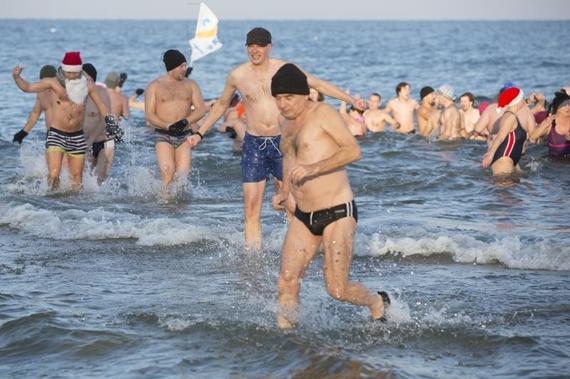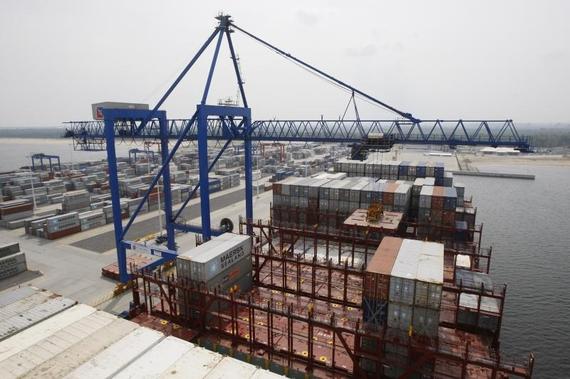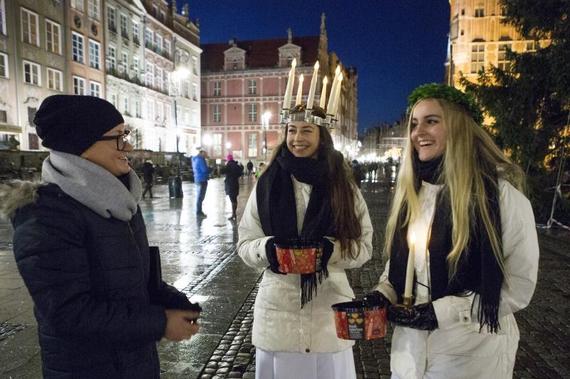Many times in history our sea was the arena of big wars. Today it is viewed as home and a uniting factor to many nations. With national politics as changing and unstable as it is today, cities, including cities of the Baltic Sea region, play ever more important role in international diplomacy. Did you know that nine countries have shorelines along the Baltic Sea? Denmark, Estonia, Latvia, Finland, Germany, Lithuania, Poland, Russia, and Sweden all surround it. All of them except Russia are members of the EU. The city of Gdansk, lying in the centre of the south coast, with its almost half million population, is one of the biggest cities in the region. And, with such a diversity of countries neighbouring with us along the coast, we feel obliged to play a leading role in building relations, starting cooperation and creating peaceful atmosphere in the Baltic Rim.
 In winter it is quite a cold sea, but there is a plenty of people happy to swim in the Baltic Sea!. Photo: J. Pinkas
In winter it is quite a cold sea, but there is a plenty of people happy to swim in the Baltic Sea!. Photo: J. Pinkas
It is more natural for local governments to strike agreements and create new opportunities for business, educational programs and sectoral exchange. That's why Gdansk is the headquarters of the Union of the Baltic Cities (UBC). It is a voluntary, proactive organization mobilising the shared potential of its member cities for a safe, sustainable and smart Baltic Sea Region. Today it is the leading network of cities in the Baltic Sea Region with members from all nine Baltic Sea countries. Founded in 1991 in Gdansk, the UBC has been doing a great job to make the Baltic Sea once again the unifying factor. The UBC has created a friendly forum that inspires and enhances the cooperation and cities' development. Our experiences vary in different fields, e.g. energy, environment, smart transportation, business, etc. The UBC's intention is to spread good solutions across the whole region and Europe.
 Business cooperation is very strong in the Baltic Sea rim. On the picture - Gdansk Deepwater Container Terminal, one of the most important terminals on the sea. Photo: J. Pinkas
Business cooperation is very strong in the Baltic Sea rim. On the picture - Gdansk Deepwater Container Terminal, one of the most important terminals on the sea. Photo: J. Pinkas
For the exchange of knowledgeThe UBC Commissions are good example of such knowledge exchange and cooperation platform. Based on the cities experiences, the Commissions meetings, held in the form of seminars or practical workshops, provide consultations and ready-to-apply solutions and ideas free of charge. The level of expertise is very high, as the city specialists and experts participate in such meetings. Quite frequently, the meetings are accompanied by visits of young talent from member cities, providing special artistic flavour in addition to bringing the artists together.
There are now seven new Commissions: Cultural Cities, Inclusive and Healthy Cities, Planning Cities, Safe Cities, Smart and Prospering Cities, Sustainable Cities and Youthful Cities. Also, the Working Group on Gender Equality has been set up.
The UBC is also a link to the EU. Our members are leaders or partners in the international projects funded from EU. The Union assists in partner search, distribute the information about projects and other undertakings.
The UBC also promotes the cities' activities and events. It maintains the website, Facebook profile and issues the Baltic Cities Bulletin bringing up the most important topics.
Most important, however, are meetings in person within the working framework of our "small fatherland" - the Baltic Rim.
When the mayor of neighbouring Kaliningrad came to visit, we talked about pros and cons of building new streetcar lines in more distant city districts, and where to buy good, slightly used streetcar equipment. We did not feel we needed to discuss politics. We both have cities with similar conditions; we might as well share advice. We are looking for common ground, where we can meet and learn from each other.
Gdansk gets beautiful cultural gifts from our neighbours: annual festivals of Lithuanian and Swedish culture, and a great opportunity to host international events in our new venues. Our sports events in a new, beautiful stadium, as well as grand musical concerts in Ergo Arena bring us ever-growing streams of close neighbours. May they grow.

